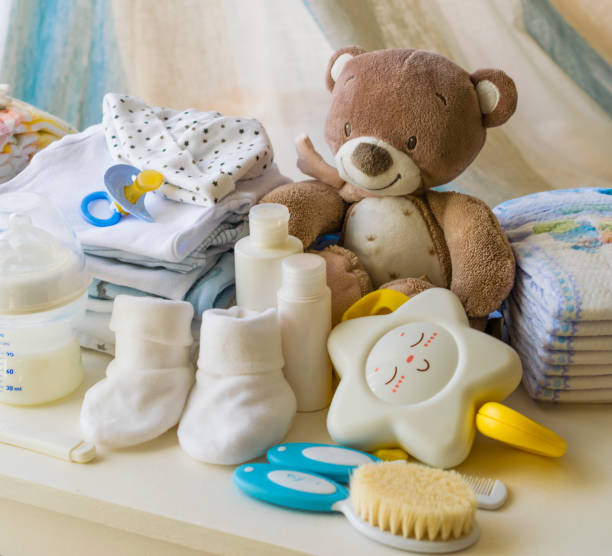Introduction
Bringing home a new baby is a joyful yet overwhelming experience for any parent. From understanding feeding schedules to recognizing the importance of sleep, there’s a lot to learn about infant care. This guide covers all the essential aspects of caring for your newborn to ensure they grow healthy and happy. Let’s dive into everything you need to know!

Bringing Baby Home Infant Care
Preparing the Nursery
Before your baby arrives, it’s essential to have a comfortable and safe nursery. Make sure the crib meets safety standards, and stock up on all the necessary items such as clothing, diapers, and baby care essentials. A baby monitor can provide peace of mind, allowing you to keep an eye on your infant at all times. Infant Care

Stocking Up on Essentials
Newborns go through more diapers and clothes than you might expect, so it’s wise to have an ample supply of onesies, wipes, and burp cloths. It’s also important to have a car seat installed and inspected for safety well before the baby’s arrival.

The First 24 Hours with Your Newborn Infant Care
Skin-to-Skin Contact
In the first few hours after birth, skin-to-skin contact is crucial for bonding and regulating your baby’s temperature and heart rate. This contact also helps initiate breastfeeding and gives your baby a sense of security. Infant Care

Newborn Feeding Schedules
Whether you choose to breastfeed or formula feed, your baby will need to eat frequently—typically every 2 to 3 hours. During the first 24 hours, they may only eat small amounts, which is perfectly normal.
The Importance of Sleep
Your newborn will likely sleep for the majority of the day, but it’s essential to create a safe sleep environment. This includes placing your baby on their back in a crib with a firm mattress and no loose bedding. (Infant Care)
Feeding Your Infant
Breastfeeding vs. Formula Feeding
Deciding whether to breastfeed or formula feed is a personal choice. Breastfeeding provides natural antibodies, but formula is also a healthy alternative. It’s essential to choose the feeding method that works best for your family.
Creating a Feeding Schedule
As you get to know your baby, you’ll begin to recognize their hunger cues. Establishing a feeding schedule helps both you and your baby develop a routine, making life a little easier in those early weeks.
Signs Your Baby Is Hungry or Full (Infant Care)
Babies communicate through body language. If your baby is rooting (turning their head and opening their mouth), making sucking motions, or putting their hands to their mouth, these are clear signs they’re hungry. On the flip side, if they turn away from the breast or bottle, they’re likely full. (Infant Care)
Understanding Newborn Sleep Patterns
How Much Sleep Do Newborns Need?
Newborns sleep a lot—up to 16 to 17 hours a day. However, they rarely sleep for long stretches at a time. It’s normal for babies to wake up every 2-3 hours for feeding and diaper changes. (Infant Care)
Establishing Healthy Sleep Habits
Although newborns aren’t ready for a strict sleep routine, creating a calming bedtime environment helps them differentiate between day and night. Keeping lights dim and avoiding loud noises can make nighttime sleep more restful.
Safe Sleep Guidelines
Always place your baby on their back to sleep and keep soft objects like blankets and toys out of the crib. Following these simple rules reduces the risk of Sudden Infant Death Syndrome (SIDS). (Infant Care)
Diapering and Hygiene
How Often Should You Change Diapers?
Newborns can go through 10-12 diapers a day! Make sure to change diapers regularly to avoid diaper rash, especially after feedings and naps.

Preventing Diaper Rash
To prevent diaper rash, keep your baby’s bottom dry and apply diaper cream as needed. If you notice redness or irritation, allow your baby to have some diaper-free time to let their skin breathe. (Infant Care)
Bathing Your Newborn
You don’t need to bathe your newborn every day. A few times a week is sufficient until they’re more active. Use gentle baby soap and keep the bath brief to avoid drying out their skin. (Infant Care)
Infant Health and Wellness
Monitoring Your Baby’s Health
It’s essential to keep an eye on your baby’s health, noting any changes in feeding, sleeping, or behavior. Regular doctor visits ensure that your infant is growing as expected and getting the necessary vaccinations.
Baby’s First Doctor Visits
Your newborn’s first visit to the doctor usually occurs a few days after birth. These visits are critical for tracking their weight, growth, and overall health. (Infant Care)
Immunizations and Why They’re Important (Infant Care)
Vaccines protect your baby from serious illnesses. Following the recommended vaccination schedule is one of the best ways to keep your infant healthy.
Bonding with Your Infant
The Importance of Bonding
Bonding creates a sense of security and comfort for your baby. Holding, talking, and singing to your baby are all excellent ways to foster that bond.
Activities to Strengthen Bonding
Simple activities like reading to your baby, baby massage, or taking walks together strengthen the parent-child connection.
How to Bond as a Family (Infant Care)
Include other family members in caregiving routines to build strong family bonds. Siblings can help with small tasks, and partners can take turns holding or feeding the baby.
Infant Crying and Soothing Techniques (Infant Care)
Understanding Why Babies Cry
Crying is your baby’s primary way of communicating. They might cry because they’re hungry, tired, need a diaper change, or simply want to be held. Sometimes, babies cry just to release tension, which can be perfectly normal. (Infant Care)
Effective Ways to Soothe Your Baby
There are many ways to soothe a crying baby. Swaddling, rocking, feeding, and singing lullabies can all help. Sometimes, a gentle ride in the stroller or car may do the trick. Every baby is different, so it may take some trial and error to find what works best for yours. (Infant Care)
When to Worry About Excessive Crying
If your baby’s crying seems excessive or doesn’t stop despite your efforts to soothe them, it could indicate discomfort or an underlying issue. Colic is one possibility, which is when a baby cries for more than three hours a day, more than three days a week. Always consult your pediatrician if you’re concerned.

Infant Developmental Milestones
What to Expect Month-by-Month
Babies grow and develop rapidly, hitting different milestones month by month. In the first month, they may start lifting their heads briefly. By three months, many babies begin to smile and respond to sounds. It’s important to remember that every baby is different and may reach milestones at their own pace.
How to Support Your Baby’s Development
You can encourage development by providing a stimulating environment with toys, books, and interaction. Talking to your baby, showing them new sights and sounds, and engaging them in tummy time all help build essential motor skills and cognitive development.
Tummy Time and Motor Skills Development
Why Tummy Time is Crucial
Tummy time is critical for developing your baby’s neck, shoulder, and arm muscles. These muscles are essential for crawling and other motor skills. It also helps prevent flat spots on the back of your baby’s head from too much time spent lying on their back.
How to Introduce Tummy Time
Start tummy time as soon as your baby comes home from the hospital. Begin with just a few minutes at a time, two to three times a day, and gradually increase the duration as your baby gets stronger.
Tracking Motor Skills Progress
Your baby will make small, but important strides during tummy time, like lifting their head and eventually pushing up on their arms. Keep an eye on these developments and celebrate every bit of progress!
Keeping Your Infant Safe (Infant Care)
Babyproofing Your Home
Once your baby starts rolling over and becoming more mobile, babyproofing your home becomes essential. Install safety gates, lock cabinets, cover electrical outlets, and secure furniture that could tip over.
Car Seat Safety Tips
Always use a rear-facing car seat for infants, and make sure it’s installed correctly. Many local fire stations or hospitals offer free car seat safety checks to ensure proper installation.
Safe Toys and Play Areas
Choose toys that are appropriate for your baby’s age, ensuring they have no small parts that could be choking hazards. Always supervise playtime, especially as your baby starts exploring new textures and objects.
Managing Parent Stress and Self-Care
The Emotional Challenges of New Parenthood
Caring for an infant is incredibly rewarding but also emotionally challenging. It’s normal to feel overwhelmed or exhausted. Remember, it’s okay to ask for help and take breaks when you need them.
Tips for Managing Stress
Creating a support system of family and friends can help lighten the load. Establishing a routine, even a loose one, can also make things feel more manageable. Consider practicing mindfulness or deep-breathing exercises when things get hectic. (Infant Care)
The Importance of Self-Care for Parents
Self-care is not selfish; it’s essential. Taking care of yourself allows you to be a better caregiver. Even if it’s just a few minutes of quiet time, a short walk, or a chat with a friend, find time to recharge.

Getting Help: When to Call the Doctor
Signs of Illness to Watch For
It’s important to be aware of common signs of illness in infants, such as fever, changes in eating or sleeping habits, or unusual fussiness. If your baby has trouble breathing, persistent vomiting, or signs of dehydration (fewer wet diapers than usual), it’s time to seek medical advice.
When to Seek Immediate Medical Attention
If your baby shows signs of a high fever (over 100.4°F in infants younger than three months), trouble breathing, or becomes unresponsive, you should contact a doctor immediately. Trust your instincts; you know your baby better than anyone else. (Infant Care)
Conclusion
Caring for a newborn is both an exciting and challenging journey. Understanding your infant’s needs, from feeding to sleep, and staying attuned to their development will help you navigate these early months with confidence. Remember, every baby is unique, and it’s okay to seek advice when you need it. Parenting is a learning process, and you’ll grow along with your baby.
FAQs
How often should I feed my newborn?
Newborns typically need to be fed every 2-3 hours, but it’s important to follow your baby’s hunger cues rather than sticking strictly to the clock.
When can I start tummy time with my baby?
You can begin tummy time from the first week, starting with just a few minutes each day and increasing as your baby grows stronger.
How do I know if my baby is getting enough sleep?
Newborns need about 16-17 hours of sleep per day, though this is broken up into short periods. If your baby seems fussy or overtired, they may need more sleep.
What should I do if my baby won’t stop crying?
Check for common issues like hunger, a dirty diaper, or fatigue. If none of these seem to be the cause, try soothing techniques like swaddling or rocking. If crying persists, consult your pediatrician.
When should I take my baby to the doctor for the first time?
Most babies have their first doctor’s visit within a few days of being born to check their weight, overall health, and development.



Pingback: Choosing the Right Daycare for Your Newborn 2025
I’ve recently started a site, the information you provide on this website has helped me greatly. Thank you for all of your time & work. “Yield not to evils, but attack all the more boldly.” by Virgil.